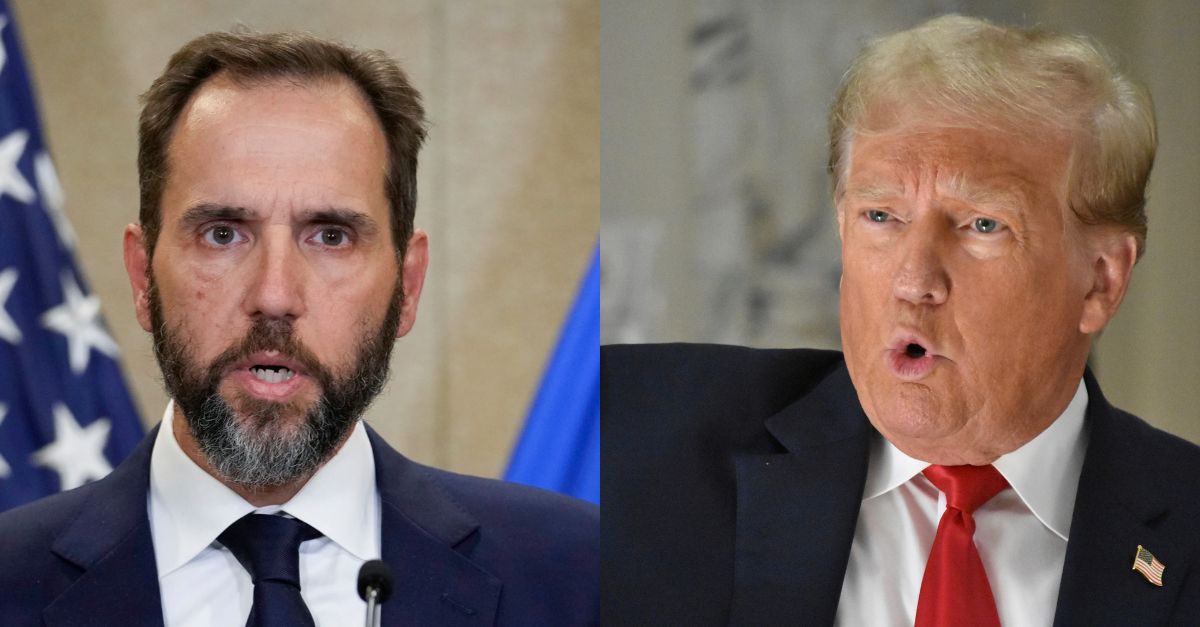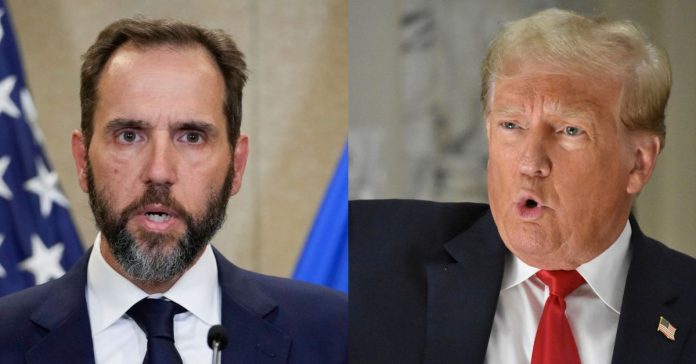
Left: Special counsel Jack Smith speaks to the media about an indictment of former President Donald Trump, Tuesday, Aug. 1, 2023 (AP Photo/J. Scott Applewhite.) Right: Former President of the United States Donald J. Trump appears in the hallway of the courthouse to speak to the press on day three of the civil fraud trial in Manhattan, New York, United States on October 4, 2023. (Photo by Kyle Mazza/NurPhoto via AP.)
At oral arguments debating whether a temporarily-lifted gag order on Donald Trump in his election subversion case in Washington, D.C., is warranted, it was a question of the First Amendment and faith — good or bad — and precisely what version of it Trump employs as he speaks about his impending trial publicly and its participants.
Though only 20 minutes were scheduled respectively for Trump’s attorneys and special counsel prosecutors to argue, proceedings ultimately spanned nearly three hours as U.S. District Court of Appeals Judges Patricia A. Millett, Cornelia Pillard and Bradley Garcia peppered lawyers with questions weighing Trump’s trial rights and the rights of the federal government under the umbrella of the First Amendment.
Debate was often heated.
Trump attorney John Sauer proffered that any suggestion of threats to any party in the matter were purely speculative and that prosecutors had failed to provide any evidence that Trump’s rhetoric, be it on social media or at rallies or on television, have so far posed any real danger.
The gag order imposed by U.S. District Judge Tanya Chutkan last month “set a terrible precedent” on political speech, Sauer argued, adding that the limited gag order was “categorically unconstitutional” because it sought to “criminalize” Trump’s speech before anything bad had even happened.
The potential for violence was not enough, he asserted.
There must be a “substantive evil” to be proven by a “solidity of evidence,” Sauer said.
The gag order was narrow in that it only prohibited Trump from attacking prosecutors, prospective witnesses and other trial participants. It did not bar him from lambasting the charges themselves or the Justice Department as a whole. He was also free, under the order, to attack the trial venue.
Sauer — once the Missouri solicitor general who argued in favor of Trump’s baseless claims that the 2020 election results were fraudulent — did not, however, address what prosecutors did provide to the court. Namely, a racist death threat made to Judge Chutkan in August and threats to special counsel Jack Smith’s wife. Since Trump’s indictment was announced this August, Trump has called Smith’s wife out by name in his posts and in the same breath where he harangues the special counsel.
Unlike Smith, however, his wife is not a public figure.
Millett, an appointee of former President Barack Obama, highlighted on Monday how the threat to Chutkan came after Trump posted a message on Truth Social that said “IF YOU COME AFTER ME, I’M COMING AFTER YOU!” [Emphasis original]
Sauer argued there was no proof to suggest that the woman charged with threatening Chutkan, Abigail Jo Shry of Texas, had even listened to Trump on social media. Shry, Sauer said, is a “mentally unstable, heavy alcoholic” who “never leaves the apartment, and watches the news, not reads things on social media.”
According to court records, Shry didn’t just threaten Chutkan in her voicemail this August; she said she would kill “anyone who went after former President Trump.”
Millett continued to throw a number of hypotheticals at Sauer, eagerly searching for the lawyer to make a distinction, if any, between the “rough and tumble” talk on the campaign trail, as Sauer described it, or something more nefarious.
“This begs question: if it is in fact political speech or if it is political speech aimed at derailing or corrupting the process,” Millett said.
Trump, she suggested, could not simply categorize any speech of his as political. A stricter balancing test would be required.
The court also asked what might happen, hypothetically, if Trump were to target Mike Pence, the former vice president and potential trial witness in March. What if Trump were to remark on social media that Pence could “still do the right thing” before he testified? Would this be constituted as a criminal violation of the gag order if it were in effect or is this yet more political speech?
Garcia, a Biden appointee, appeared somewhat incredulous at Trump’s argument that the court’s “hands would be tied” only until an “actual” threat had come to pass and a “clear and present danger” presented itself.
Threats to the trial proceedings in Washington, D.C., seemed “on track to intensify” Garcia offered, noting the approaching election. The judge asked Sauer pointedly: why must the court “wait and see?”
Hedging on the question, Trump’s lawyer repeatedly bristled at the hypotheticals, speaking fast and, at times, sounding nearly out of breath.
The court would have to prove whether Trump’s statements on social media were a “direct communication” to a witness, he said, telling the court he “resisted trying this case on hypotheticals.”
But Millett assured him she was merely trying to understand the logic of his legal arguments and was not “threatening the First Amendment broadly.”
The panel’s tone was often sharp with Sauer as he danced around questions about trial integrity or the need for protections in reasonable circumstances, prompting Pillard, an Obama appointee, to remark well into the first hour: “It is revealing the fortitude you afford to the First Amendment and really the lack of any role protecting the jurors.”
During oral arguments for the prosecution — which also long exceeded the 20 minutes typically allotted — assistant U.S. Attorney Cecil Vandevender said the record brimmed with examples of Trump’s “well-established practice of using his platform to target his adversaries” and that this pattern of rhetoric, if left totally unchecked, would endanger proceedings in numerous ways. That would include discouraging public civil servants from taking on cases associated with Trump.
The judges seemed unpersuaded by this particular line of argument, noting that Smith was a taxpayer-funded public figure who could reasonably expect to see his name in headlines or spilling from the lips of an adversarial criminal defendant. On balance with the First Amendment, Millett suggested that prosecutors may not be considering the rigorous protections afforded to political speech. Plus, she prodded: was Trump’s “inflammatory language,” as highlighted in the request for the gag order, really so withering it could deter them from their work?
“It creates a world in which public servants will have to decide: Do I want to handle this case or in doing so, will I be threatened? Or will my family be threatened? There’s a chilling effect cast over the entirety of proceedings if they feel they are at risk just because they take the case,” Vandevender argued.
“Surely he has a thick enough skin,” Pillard replied.
Vandevender argued the same could happen to jurors. If Trump is allowed to attack them, why would they want to perform their civic duty under those conditions, he argued.
The government is not trying to box Trump in or make it impossible for him to openly discuss the case or its merits, he urged.
While appearing to agree with Millett, who suggested that Trump cannot be expected to be “Miss Manners” as he campaigns, the prosecutor was emphatic that the Supreme Court settled in the case of Gentile v. United States that limits on speech can be established when if a substantial threat of material prejudice is present.
The court asked the prosecutor whether he thought there was any other tool that could be used, short of a gag order, that would stop threats without infringing on any First Amendment rights. Millett was particularly keen on how to protect jurors from any possible doxxing, or the sharing of a person’s private information publicly.
“We do have, as you appreciate, the problem of speech by the defendant, and then it has the knock-on effect with the loyalists’ zeal, and that’s then, you know, what causes direct efforts at threatening and harassing individuals,” Millett said.
“I’m not aware of any technological tools that would work nearly as well as mitigating this prejudice at the source,” Vandevender said.
Trump first appealed the gag order in mid-October.
It is unclear how quickly judges at the appellate court could reach a decision, though they have agreed to handle it expeditiously.
We want Law&Crime to be your favorite destination for all things true crime
To continue bringing you the very best content, we rely on valuable feedback from our loyal viewers. We invite you to take a brief survey about the kind of programming you want to see more of from us. Participation is anonymous and will only take about 3 minutes.
Have a tip we should know? [email protected]

